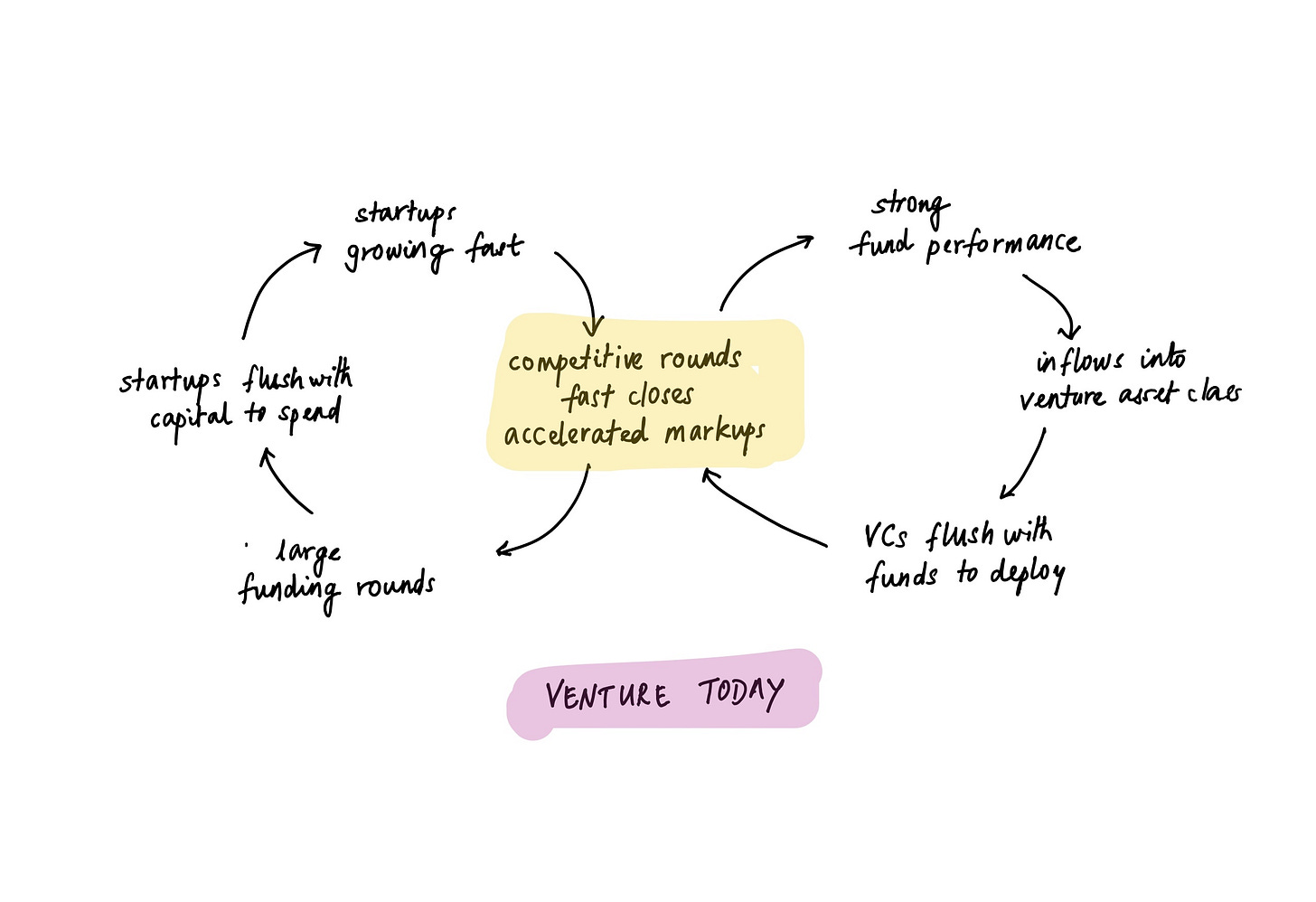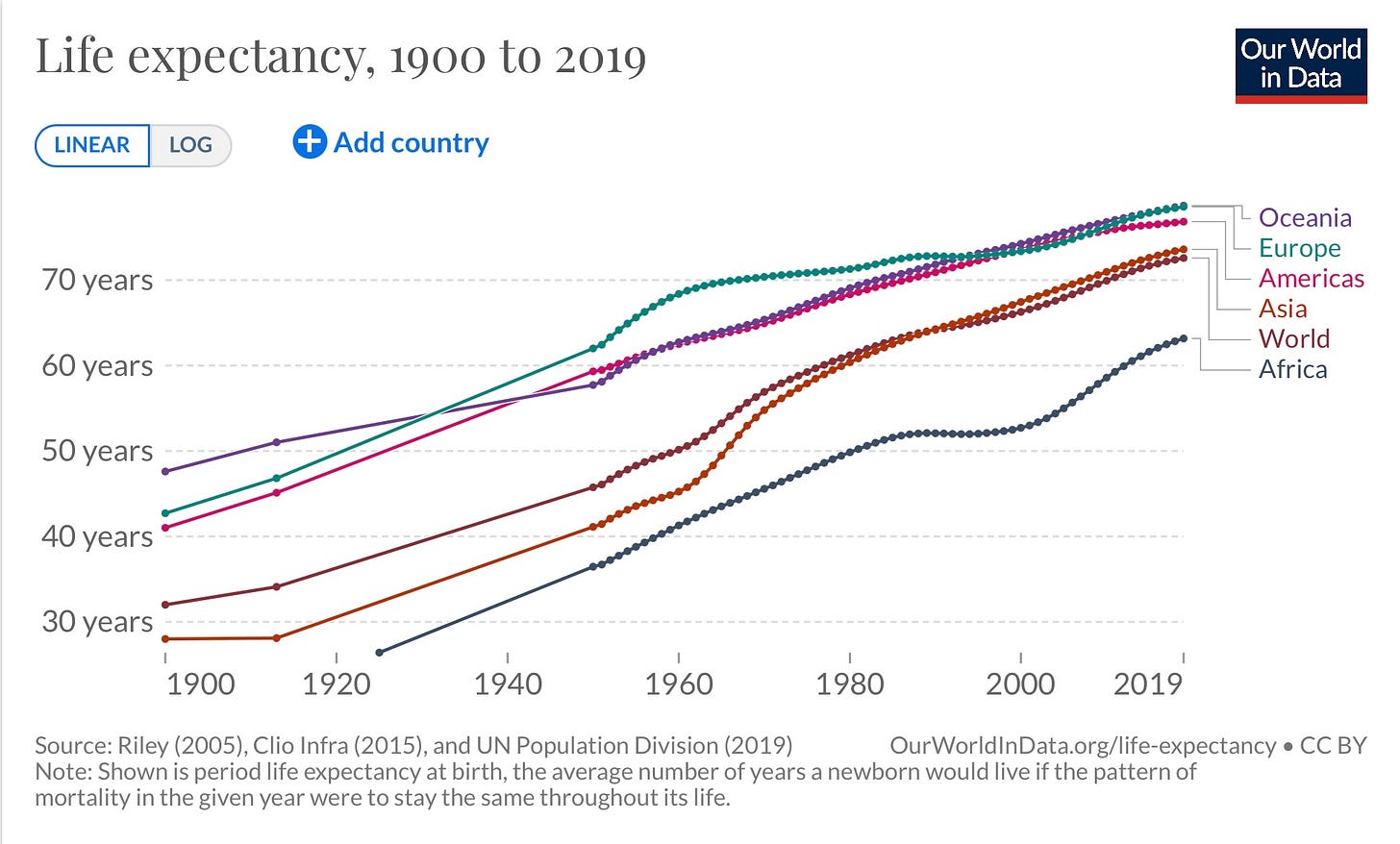Laps Around the Sun
Tippets #169: Venture, tech hiring, Swiss bankers, and more. Enjoy!
A warm welcome to all new readers who are getting this for the first time. Thank you for letting me be a small part of your week. As a reminder, Tippets is where I share my thoughts on topics I find interesting, usually centered around technology and psychology, as well as an assortment of tidbits and snippets (aka. tippets!) from to mix it up!
Forwarded this email? Subscribe below. Enjoyed this email? Forward it to a friend.
Last week marked my 35th lap around the sun. Now solidly in my mid-thirties, I don’t think I ever thought about turning 35 until it started to approach. It’s an age I feel is very much neither here nor there. Not a milestone birthday like 30 or 40 (I certainly have never thought to myself, “By the time I’m 35 I’m going to…”) yet still having a kind of weight, a significance that I can’t quite place.
Some friends consider me a baby. To others, I’m very much ‘old’. I don’t feel ‘old’. However, when I look at some of the mile-markers of my life - married for eight years to the love of my life, two wonderful kids, house in the suburbs, running my own business after having had the chance to work around the world - we’re definitely not getting ‘young’ vibes.
Upon further investigation into this random age of 35, I stumbled into a stat that surprised me. In 1912, the global life expectancy was just over 34 years old. If I were alive 110 years ago and made it to this 35th birthday, I would have outlived a significant portion of the planet. At just 35.
So, I look forward to this next lap around the sun, excited to continue experimenting, learning, and growing. But more than anything, I am filled with gratitude and hope, very glad I’m living in 2022 not 1912. Cheers!
P.S. If you’re looking for some a sobering read on life, aging, and the value of time, I strongly recommend checking out this Wait but Why post by Tim Urban called Tail End.
Tippets from Around the Web:
Minsky Moments in Venture Capital
A tremendous piece by Abraham Thomas on the current state of venture capital and the impact of compressed timelines on the entire industry. If you’re at all involved with or interest in venture capital, startups, or investing, this is a must read.

Tech Companies Face a Fresh Crisis: Hiring
The pandemic has brought with it the Great Resignation, a talent tsunami that has people around the world questioning their current employ. From my post, The Coming Tsunami, last year:
‘Work’ today is more than just a paycheck. It is a sense of belonging. Identity. Self-worth. COVID has forced everyone, whether they like it or not, to reexamine their work lives and decide whether their current roles, managers, and company satisfies the “whole person”. A lot of people are finding the answer is no. And so the search for opportunities that provide a greater chance to thrive begins.
Employees are being more selective than ever. This has made hiring incredibly challenging. Conversations I have with founders inevitably turn to positions they are looking to fill and there is anyone in network I know that might be interested. According to this NYT article featuring the challenges of recruiting:
Along with microchips, toilet paper and Covid tests, tech workers will be recalled as one of the great, pressing shortages of this pandemic. Estimates of the unemployment rates for tech workers are about 1.7 percent, compared with roughly 4 percent in the general economy; for those with expertise in cybersecurity, it’s more like 0.2 percent.
More than ever, companies need to figure out how to drive signal amongst the noise.
AI-generated faces have crossed the uncanny valley and are now more trustworthy than real ones
A new study has come out showing just how good AI has gotten at creating ‘fake faces’. These synthetic images are created by deep-learning-based neural networks known as GANs (generative adversarial networks) and my, have they gotten good. And the crazy part? The fake faces appear more trustworthy.
They didn’t anticipate, however, that when participants were asked to rate a set of real and fake faces based on their perceived trustworthiness, people would find synthetically generated faces 7.7% more trustworthy than real ones—a small but statistically significant difference.
A quiz for you: Which of the below are fake vs. real?
Answers at the bottom. I only got one right…
Revealed: Credit Suisse leak unmasks criminals, fraudsters and corrupt politicians
Banking secrecy laws and a promise of discretion have made Swiss bankers incredibly wealthy over the last few centuries. Anyone who’s watched a Bourne, Bond, or basically any spy thriller knows that Swiss banks are where the ‘bad guys’ store their money (especially prior to the advent of cryptocurrencies). This stereotype has just been reinforced thanks to a massive account leak showing details of accounts linked to 30,000 Credit Suisse clients all over the world.
[The leak] unmasks the beneficiaries of more than 100bn Swiss francs (£80bn) held in one of Switzerland’s best-known financial institutions…The leak points to widespread failures of due diligence by Credit Suisse, despite repeated pledges over decades to weed out dubious clients and illicit funds.
They include a human trafficker in the Philippines, a Hong Kong stock exchange boss jailed for bribery, a billionaire who ordered the murder of his Lebanese pop star girlfriend and executives who looted Venezuela’s state oil company, as well as corrupt politicians from Egypt to Ukraine.
This is sure to be a story that evolves over the next few months, and I’m very much here for it.
Americans are more worried about their sons than their daughters
According to a survey of 3,000 adults conducted by the American Family Survey, Americans are worried about their kids. And more specifically, worried about their boys. The Brookings Institute breaks down the survey by race, and political affiliation, with some interesting points of note:
Conservatives and men are worried about boys but all groups are worried about their own sons
Daughters are seen as having more “grit” than sons
Parents, especially Black parents, think their daughters more likely to become President
Interesting data that further reinforces the need to take care of our kids. Per Brookings:
In reality, boys and girls and men and women face different and changing challenges. The need here is for a political and policy agenda that recognizes and responds to the specific problems of boys and girls, especially those of different racial and class backgrounds. There are a lot of feminists out there still fighting for women’s rights, but also worrying about their sons—both for good reason. Gender relations are not a zero-sum game.
Image answers:
1. Fake
2. Real
3. Real
4. Fake
Quote I’m thinking about: “Confidence comes not from always being right but not fearing to be wrong.” - Peter McIntyre
Please share what you’re reading! If you have insight on anything mentioned above or have any interesting links/papers/books that you think would be worth sharing in future issues of Tippets, please reach out! Click here, reply to this email, or DM me on Twitter at @taps.
How did you like this week’s Tippets? Your feedback helps me make this better every issue.








